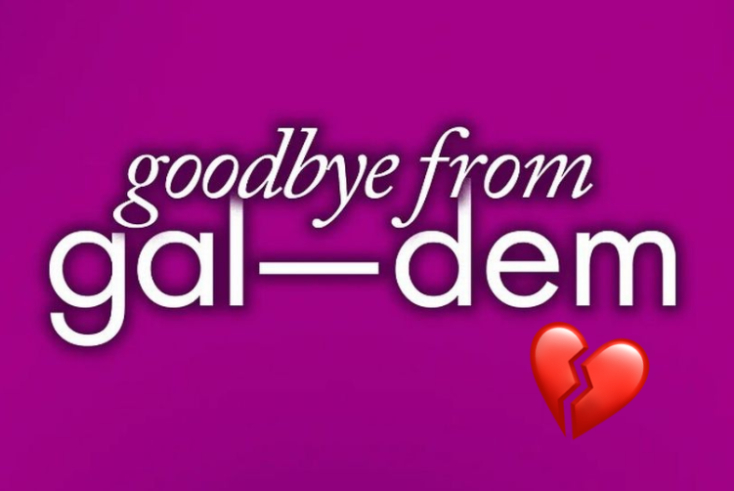Goodbye from gal-dem: a call to action for the media industry

Opinion
Gal-dem closing its doors should be a cause for great concern for the media industry’s present and future.
It’s been two weeks since gal-dem announced that it would close following eight years of providing a platform for news, perspectives and features centring the voices of women and non-binary people of colour.
On 31 March, gal-dem shared that continuing to operate as a business was “no longer feasible”. You can read the company’s full letter here.
I wanted to share these thoughts on the day of the announcement, but decided against it, thinking they might be superfluous. I also know there’s more I could have done to support gal-dem while they were around.
However, I haven’t been able to stop thinking about this news.
I truly believe that gal-dem’s closure should be a cause for great concern for the media industry. I share these thoughts today because gal-dem’s closure is all of our business. A diverse media landscape reflects, represents and reaches our diverse population. A media industry without titles like gal-dem is so much poorer.
While there was already a scarcity of publishers and platforms owned by minoritised people, and representing minoritised lived experiences and viewpoints, gal-dem always stood out as a platform with a particularly strong brand, distinctive, impassioned and polished, and for its editorial excellence.
So, it’s all the more shocking and lamentable that it will cease to exist. Many of its writers have gone on to publish books and write for newspapers and magazines; gal-dem was an incubator for outstanding journalists and creators.
gal-dem also stood out because their content was interesting, varied and unique. It had flair. Their inclusive editorial approach made crucial space for intersectional perspectives (like Queeries, their LGBTQ+ reader questions stream), and the platform highlighted difficult and essential topics like mental health, sexual harassment and other traumas, as well as positive topics celebrating creativity and dissecting and culture.
One example is this recent brilliant article; An ode to Black Essex girls. Where else would this be published?
With their closing statement, gal-dem graciously shared a list of 17 other independent media titles.
This tweet, published on the day of the announcement, captures perfectly many people’s reaction to the news:

In a world where minoritised voices are still far too rarely heard in mainstream media, gal-dem’s closure is a traumatic blow — a silencing of sorts — inflicted by the hostile commercial realities of being an independent media platform.
Some longstanding media brands have made admirable efforts to create platforms for minoritised voices. The Independent, for example, stands out for their appointment of the brilliant Nadine White, the UK’s first dedicated Race Correspondent. Nadine’s is a solitary and crucial voice highlighting the achievements, lived experiences, and challenges of people who, without her platform, would in many cases be invisible to society.
Channel 4 are also commendable for initiatives like Black to Front, a TV takeover which celebrates Black creativity, and by bringing to life essential research like Black Owned Businesses, which they recently undertook in partnership with Clear Channel UK, The Good Side and Lydia Amoah FRSA.
Ultimately, however, a healthy and fair media industry must make space for commercially viable independent publishers and platforms. Investment from agencies and advertisers is fundamental to this.
At UM, we have inspiring clients who set annual targets for media investment in community media that are owned by, and targeted to, under-served audiences. This demonstrates genuine commitment to nourishing minoritised people’s spaces and cultures. We are proud to enable their commitments through our Better World Media conscious media solutions.
There can be challenges in selling in independent media, typically hinging on measurement limitations (partnership investments are sometimes modest, and therefore tricky to track through brand lift studies or econometrics).
Another perceived challenge is limited reach, however I truly believe that the quality of reach to be achieved by partnering with independent media, can offer incremental impact. We have seen this through above-average engagement rates when working with community media.
Authentic media spaces engage audiences in a way that is intimate, strong and meaningful. Being seen here is a fantastic opportunity for brands. Brands investing in community media make a proud statement of support for minoritised communities and culture, and the meaning of this is not lost on savvy audiences.
Finally, I would also say that supporting independent media goes beyond providing crucial commercial investment. In smaller publishers and platforms, the person responding to a brief is sometimes the same person editing or creating content. The chances of burnout are clear. These teams are under huge pressure, not least to serve as a platform for a whole community, which must be a very emotionally charged line of work.
So, as well as commercial investment, we should offer this much-too-small group of founders and leaders in the independent media space all the help, solidarity and positivity we can, to give them the best chances of thriving, and feeling supported and valued while they do.
 Michael Brown is managing partner of insight, data solutions & marketing, UM UK. He also sits on the IPA’s Talent Leadership Group and is founder and chair of #MRSpride, the market research sector’s LGBTQ+ network.
Michael Brown is managing partner of insight, data solutions & marketing, UM UK. He also sits on the IPA’s Talent Leadership Group and is founder and chair of #MRSpride, the market research sector’s LGBTQ+ network.



